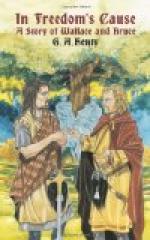“It will not be the last, I hope,” Archie said, “for there stands Dunstaffnage Castle, and the lands all belong to the MacDougalls. It is but two months back I was a prisoner there, and though I then escaped, assuredly if I again get within its walls I shall never go out again. As well be drowned here.”
“Then we will hope,” the fisherman said, “that `tis into some other harbour that this evil wind may blow us; but as you see, young sir, the gale is the master and not we, and we must needs go where it chooses to take us.”
Fiercer and fiercer blew the gale; a tremendous cross sea was now running, and the boat, stout and buoyant as she was, seemed every moment as if she would be engulfed in the chaos of water. Small as the sail had been it had been taken down and lashed with ropes to the yard, so that now only about three square feet of canvas was set.
“We can show a little more,” the fisherman shouted in Archie’s ear, “when we get abreast of Islay, for we shall then be sheltered from the sea from the west, and can run more boldly with only a following sea; but till we get out of this cross tumble we must not carry on, we only want steerage way to keep her head straight.”
Never before had Archie Forbes seen a great gale in all its strength at sea, for those which had occurred while at Rathlin were as nothing to the present; and although on the hillside round Glen Cairn the wind sometimes blew with a force which there was no withstanding, there was nothing to impress the senses as did this wild confusion and turmoil of water. Buoyant as was the boat, heavy seas often broke on board her, and two hands were constantly employed in bailing; still Archie judged from the countenance of the men that they did not deem the position desperate, and that they believed the craft would weather the gale. Towards midday, although the wind blew as strongly as ever, there was a sensible change in the motion of the boat. She no longer was tossed up and down with jerky and sudden motion, as the waves seemed to rise directly under her, but rose and fell on the following waves with a steady and regular motion.
“We are well abreast of Islay,” the old fisherman said when Archie remarked on the change to him. “There! do you not see that dark bank through the mist; that is Islay. We have no longer a cross sea, and can show a little more sail to keep her from being pooped. We will bear a little off toward the land — we must keep it in sight, and not too far on our left, otherwise we may miss the straits and run on to Jura.”
A little more sail was accordingly shown to the gale, and the boat scudded along at increased speed.
“How far is it to Colonsay?” Archie asked.
“Between fifty and sixty miles from Rathlin,” the fisherman said. “It was eight o’clock when we started, ten when the squall struck us, it will be dark by four, and fast as we are running we shall scarcely be in time to catch the last gleam of day. Come, boys,” he said to his sons, “give her a little more canvas still, for it is life and death to reach Colonsay before nightfall, for if we miss it we shall be dashed on to the Mull long before morning.”




